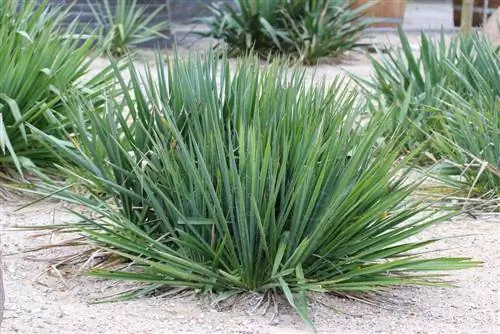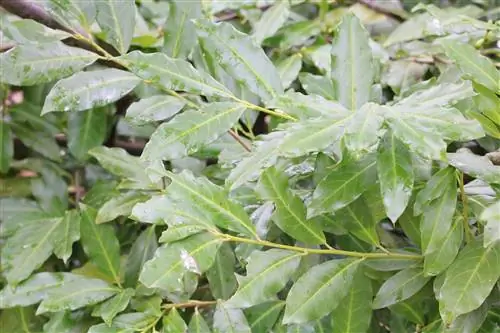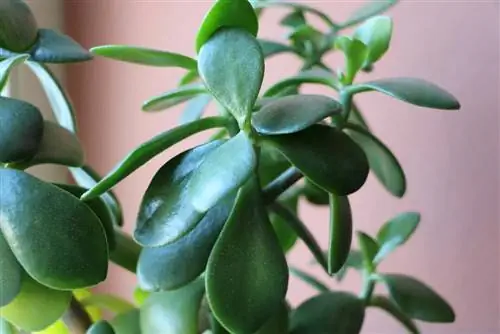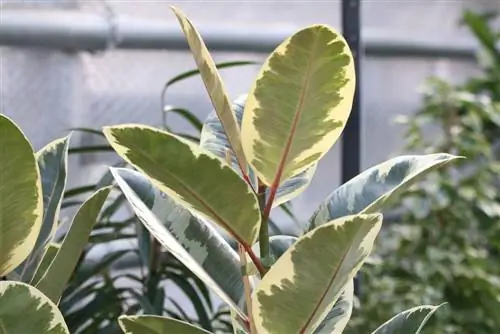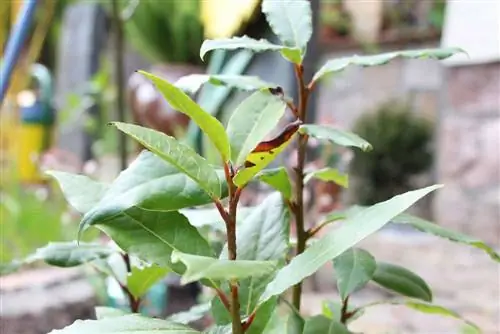- Author admin caroline@plants-knowledge.com.
- Public 2023-12-17 03:39.
- Last modified 2025-06-01 06:48.
In addition to the indoor yucca that can be found in many households, there are also some outdoor yuccas that thrive in the garden even in the local climatic conditions. But whether in the living room or in the garden: cat owners should exercise extreme caution around palm lilies.
Yucca palm contains blood-causing saponins
The experts are still divided on whether the yucca - no matter what kind - is actually poisonous to cats or not. Some experts consider the palm lily to be completely harmless, while others point to known cases of poisoning. In fact, there are currently no known substances that confirm their toxicity to cats - although no in-depth research has yet been carried out in this regard. All that is known is that the plants contain saponins. These are generally harmless, but if they get into the bloodstream of your four-legged friend, they can break down the red blood cells.
Some cats are very sensitive to the yucca palm
It is well known that cats like to nibble on house and garden plants. They do this, even if they are pure carnivores, in order to cover their needs for fiber and important vitamins such as folic acid. Another reason for this behavior is that the greens make it easier to regurgitate the hair that is swallowed while brushing. Ergo, it is a behavior typical of cats that cannot be trained out of the animals - and of course it should not be, because it serves he alth care.
Now there is the common problem that our domesticated house cats can no longer distinguish between poisonous and non-poisonous plants and therefore, because of their immense curiosity, they generally nibble on everything. Although the yucca is not necessarily considered poisonous, it can still cause mild to severe symptoms of poisoning in some cats.
Tip:
As a responsible cat owner, you should remove potentially dangerous plants from your home and garden or arrange them so that your four-legged furry friend cannot be tempted. Also, offer your cat safe cat grass to nibble on and satisfy its appetite for greens.
Be careful of the sharp-edged leaves of the Yucca palm
However, the yucca is not only dangerous for cats because of its potential toxicity, but above all because of its sharp-edged leaves. The hard foliage of the yucca has a saw edge that can seriously injure not only human but also animal skin. If your cat has chosen the yucca as a scratching post, it is particularly at risk. Therefore, position the indoor tree so that the house cat is not even tempted to sharpen its claws on the exotic plant. In addition, offer your cat a real scratching post - otherwise it could not only attack the yucca, but also your furniture.
Be careful with outdoor animals too
- Common garden yuccas also potentially dangerous -
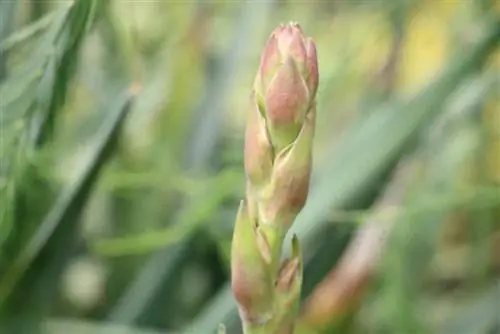
In addition to Yucca elephantipes, which are cultivated exclusively as houseplants, several other Yucca species can be found in German gardens, but they usually grow without a stem or only with a short trunk. But these outdoor yuccas delight with their delightful inflorescences, over two meters high and reminiscent of lily of the valley in scent and shape. Just like the native early bloomer, the filamentous palm lily (Yucca filamentosa) is also considered poisonous. Apart from that, their leaves are also very sharp and can therefore cause serious injuries.
Other outdoor Yucca species that are potentially dangerous to cats are:
- Candle palm lily (Yucca gloriosa)
- Blue palm lily (Yucca baccata)
- Blue-green palm lily (Yucca glauca)
- Big Bend Yucca (Yucca rostrata)
- Yucca thompsoniana
Garden owners with outdoor cats should consider before planting one of these species that even experienced outdoor cats will generally nibble on anything that looks interesting - they no longer have the experience and instinct of their ancestors, who learned this knowledge from their mothers as kittens have learned.
What to do if the cat ate the yucca palm?
If your cat doesn't resist the temptation and has tasted the yucca palm, don't panic right away. In most cases, nothing happens - unless your cat is a sensitive cat and reacts with the typical symptoms of poisoning. However, if your pet has injured itself on the sharp leaves, a visit to the vet may be necessary immediately. You should definitely disinfect and bandage the injury, it may even need to be stitched due to the better chance of healing.
Symptoms of poisoning
You should also go to the vet if your cat shows one or more symptoms of poisoning after nibbling on parts of the yucca palm:
- Cat is visibly uncomfortable, is uncharacteristically dull and/or aggressive
- has tendencies to want to hide
- has difficulty breathing
- trembling and/or convulsing
- vomits and/or has diarrhea
- urinates noticeably often
- has increased salivation
- shows dilated pupils
- coughs and/or sniffles strangely
Be sure to tell the veterinarian that the cat ate the yucca palm and then developed the symptoms of poisoning. This makes the diagnosis easier so that your pet can be helped more quickly and sustainably.
First aid measures in case of poisoning
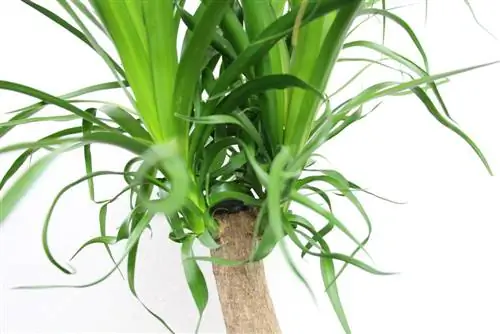
If your cat is poisoned by the yucca palm, avoid trying to cure it with all sorts of home remedies. Do not give the animal milk, tea, oil, s alt or any other medication (possibly from your own medicine cabinet) or natural remedies. Such improper treatments do more harm than good. Your pet is actually better off with a specialist who can treat it appropriately. Also remember that a cat is not a human being and that medications and remedies intended for humans can most likely even be poisonous to your four-legged friend.
How to prevent yucca palm poisoning
The only way to prevent poisoning is to keep possible toxins (in this case the potentially poisonous yucca palm) away from the cat. So don't cultivate palm lilies in rooms where cats often stay - especially if the meowing furry friends can be found there more often in your absence and therefore have a greater chance of causing even more mischief.
Tip:
If your cat has already been poisoned by a yucca and then vomited, be sure to clean the animal's fur. Otherwise, it could poison itself again during later grooming because it uses its tongue to absorb any poison that is still in the fur.
Conclusion
In principle, the yucca or palm lily is considered non-toxic for cats. However, there are many cases in which the animals suddenly showed mild or even severe symptoms of poisoning after nibbling on plant parts. The exact cause of this is not yet known, but saponins are suspected to be a possible culprit. If they get into the bloodstream, these can break down the red blood cells. You should also be careful about the very sharp-edged, saw-toothed and hard leaves of the yucca, which the animals can seriously injure themselves on, for example when scratching or eating.

